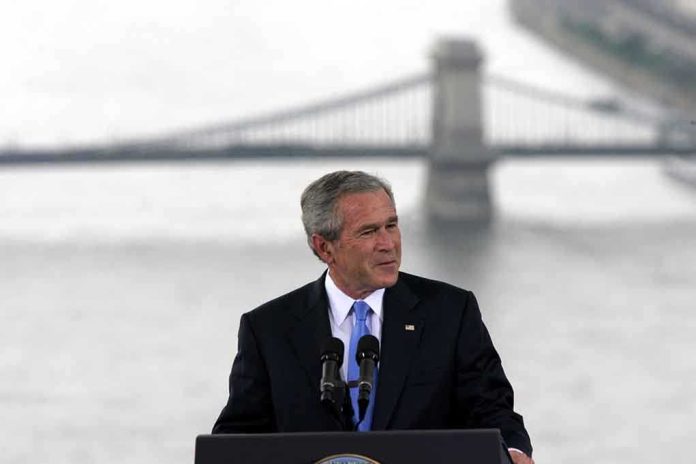
Few American partnerships have shaped the course of a nation like the alliance between George W. Bush and Dick Cheney, a bond now marked by an absence that echoes through the halls of power.
Story Snapshot
- George W. Bush hailed Dick Cheney as a steady force during national crises, emphasizing his pivotal role in American history.
- Cheney’s leadership style and influence on post-9/11 policy left an indelible mark, sparking both admiration and controversy.
- The Bush-Cheney dynamic redefined the modern vice presidency, setting a precedent that endures in political memory.
- Cheney’s passing closes a consequential chapter, prompting reflection on legacy, loyalty, and the burdens of command.
Cheney’s Steadfastness in Turbulent Times
George W. Bush’s public tribute to Dick Cheney as “a calm and steady presence” in the White House was not mere courtesy. During the gravest moments of his presidency—especially in the aftermath of September 11, 2001—Bush leaned on Cheney’s composure and experience. Cheney’s reserved demeanor, often mistaken for aloofness, concealed a methodical strategist with a penchant for decisive action. His influence was most visible when the country faced existential threats, and his counsel helped steer America through uncertainty.
Cheney’s approach to crisis management was rooted in preparation and pragmatism. Those who worked closest with him describe a vice president who thrived in the shadows, preferring results over recognition. Bush’s reliance on Cheney’s judgment, especially in matters of national security, proved vital as the administration confronted challenges unseen in generations. The vice president’s steadying hand was a comfort to Bush, but also a source of controversy as critics questioned the extent of his reach behind the scenes.
The Quiet Power Behind the Throne
Cheney’s tenure redefined the expectations of the vice presidency, transforming what had often been a ceremonial role into a fulcrum of executive power. His partnership with Bush was not merely hierarchical; it was symbiotic. Cheney’s decades of government service—spanning Congress, the Pentagon, and the private sector—afforded him a mastery of the levers of government. He wielded this expertise to shape both foreign and domestic policy, often with a level of autonomy unprecedented for a vice president.
Cheney’s influence was most pronounced in the administration’s response to terrorism. The creation of the Department of Homeland Security, the authorization of military force, and the controversial use of enhanced interrogation techniques all bore his fingerprints. Supporters saw these actions as necessary bulwarks against future attacks, while detractors warned of overreach and erosion of civil liberties. The debate over Cheney’s legacy continues, a testament to the complexity of wielding power in extraordinary times.
A Legacy of Loyalty and Division
Bush’s eulogy for Cheney underscored not just loss, but gratitude for a partnership forged in crisis. Their relationship was built on mutual respect and a shared sense of mission. Yet, Cheney’s legacy remains polarizing. To admirers, he embodied resolve, loyalty, and the courage to make unpopular decisions for the sake of security. To critics, he symbolized the dangers of unchecked executive authority and secrecy in government.
As the nation reflects on Cheney’s passing, questions linger about the balance between security and liberty, the cost of decisive leadership, and the burdens carried by those who govern in perilous times. The Bush-Cheney era, for better or worse, set a standard for partnership at the highest levels—a standard that subsequent administrations have struggled to emulate. Cheney’s absence will be felt not just by his former president, but by a country still grappling with the consequences of his choices and the nature of leadership itself.



